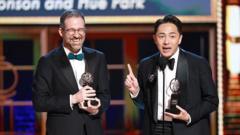The recent triumph of the Broadway production, Maybe Happy Ending, at the Tony Awards has positioned South Korea as a rising cultural powerhouse. With six awards, including Best Musical, this extraordinary achievement reflects the country's growing influence in the global entertainment arena.
South Korea's Cultural Renaissance: Six Tony Wins for Maybe Happy Ending

South Korea's Cultural Renaissance: Six Tony Wins for Maybe Happy Ending
South Korea celebrates a significant cultural milestone, winning its first Tony Awards with the musical Maybe Happy Ending.
In a historic moment for South Korea, the Tony Awards showcased the talented production of Maybe Happy Ending, which explores a romance between two humanoid robots in Seoul. The musical debuted in South Korea nearly a decade ago and made its Broadway debut scheduled for 2024. This year, Maybe Happy Ending secured six Tony Awards, marking the first win for South Korea at this renowned ceremony.
Before this Broadway adaptation, Maybe Happy Ending originally premiered in Seoul in 2016, receiving widespread acclaim and multiple revivals. This year, it entered the Tony Awards with ten nominations and ultimately won in six categories, including Best Musical, Best Original Score for South Korean lyricist Hue Park and American composer Will Aronson, as well as Best Book of a Musical. Their collaboration began at New York University, where they melded Korean and English elements into the musical's script.
Social media reactions expressed pride in South Korea’s cultural achievements, with many likening this moment to previous accolades won by South Korean artists. The success of Maybe Happy Ending parallels that of notable South Korean projects, such as the Emmy-winning series Squid Game and Oscar-winning film Parasite, both of which have helped spotlight Korean art globally.
One notable factor in the musical's reception was how it retained Korean cultural elements; references to locations like Jeju Island and traditional plants were enthusiastically highlighted by fans. The successful integration of these aspects has reinforced Korean culture and artistry's importance on an international stage.
Former Glee star Darren Criss, who reprises the role of one of the robots, Oliver, earned the Tony for Best Lead Actor in a Musical — a first for him. Meanwhile, Helen J. Shen plays the role of robot Claire, rounding out a compelling cast that has faced a successful awards season, robustly awarded at events such as the Outer Critics Circle Awards and Drama League Awards.
As K-pop groups like BTS and Blackpink usher in a new era of entertainment, the triumph of Maybe Happy Ending at the Tonys exemplifies South Korea's artistic evolution and international cultural relevance. Each accolade brings additional recognition to South Korea's burgeoning status within the global arts community, fueling anticipation for future Korean productions.
Before this Broadway adaptation, Maybe Happy Ending originally premiered in Seoul in 2016, receiving widespread acclaim and multiple revivals. This year, it entered the Tony Awards with ten nominations and ultimately won in six categories, including Best Musical, Best Original Score for South Korean lyricist Hue Park and American composer Will Aronson, as well as Best Book of a Musical. Their collaboration began at New York University, where they melded Korean and English elements into the musical's script.
Social media reactions expressed pride in South Korea’s cultural achievements, with many likening this moment to previous accolades won by South Korean artists. The success of Maybe Happy Ending parallels that of notable South Korean projects, such as the Emmy-winning series Squid Game and Oscar-winning film Parasite, both of which have helped spotlight Korean art globally.
One notable factor in the musical's reception was how it retained Korean cultural elements; references to locations like Jeju Island and traditional plants were enthusiastically highlighted by fans. The successful integration of these aspects has reinforced Korean culture and artistry's importance on an international stage.
Former Glee star Darren Criss, who reprises the role of one of the robots, Oliver, earned the Tony for Best Lead Actor in a Musical — a first for him. Meanwhile, Helen J. Shen plays the role of robot Claire, rounding out a compelling cast that has faced a successful awards season, robustly awarded at events such as the Outer Critics Circle Awards and Drama League Awards.
As K-pop groups like BTS and Blackpink usher in a new era of entertainment, the triumph of Maybe Happy Ending at the Tonys exemplifies South Korea's artistic evolution and international cultural relevance. Each accolade brings additional recognition to South Korea's burgeoning status within the global arts community, fueling anticipation for future Korean productions.



















